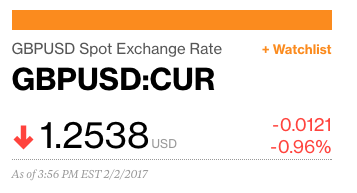NEW YORK – The dollar was flat on Thursday after hitting its lowest level since mid-November, while world equity markets were mixed as investor concerns about the Trump administration’s aggressive language toward Iran offset strong data on the world economy.
Iran was on its last legs and ready to collapse until the U.S. came along and gave it a life-line in the form of the Iran Deal: $150 billion
— Donald J. Trump (@realDonaldTrump) February 2, 2017
U.S. stocks fell after President Donald Trump’s latest remarks on trade. In a meeting with lawmakers, Trump said he would like to speed up talks to either renegotiate or replace the North American Free Trade Agreement (NAFTA).
Trump also told reporters separately that “nothing is off the table” in dealing with Iran after its recent ballistic missile test. His comments came a day after his national security adviser put Tehran “on notice” over the test.
Investors also focused on solid economic readings from around the globe on manufacturing and inflation that suggest an improvement in 2017 as they positioned ahead of Friday’s U.S. nonfarm payrolls report.
“Tomorrow’s NFP report is very, very important,” said Douglas Cote, chief market strategist at Voya Investment Management. “The ADP report yesterday was very strong, corporate earnings were very strong, so we are in a positive fundamental backdrop for the economy, for corporations, for employment.”
The Dow Jones Industrial Average fell 41.12 points, or 0.21 percent, to 19,849.82, the S&P 500 shed 3.62 points, or 0.16 percent, to 2,275.93 and the Nasdaq Composite dropped 14.71 points, or 0.26 percent, to 5,627.93.
On Wednesday, the Federal Reserve left interest rates unchanged after its latest policy meeting even as it painted an upbeat picture of the economy.
The U.S. central bank, which has signaled three rate hikes for 2017, did not indicate when it might raise rates again, as it waits to see the impact of Trump’s economic and trade policies.
“The Fed is concerned that the unraveling of trade deals could be very negative to the economy,” said Peter Cardillo, chief market economist at First Standard Financial in New York.
“You could have improving earnings and good news on the economy, but that is getting overshadowed by the ‘worry trade’ with investors taking on a wait-and-see attitude.”
POUND FALLS
The dollar index, which tracks the U.S. unit against six world currencies, fell to 99.233, its lowest level since Nov. 14. But it recovered and was last trading little changed from its levels late on Wednesday.
Benchmark 10-year Treasury notes were similarly flat in price to yield 2.47 percent.
Britain’s pound fell against the dollar and euro after the Bank of England, while raising its forecast for British economic growth this year, kept monetary policy unchanged and said rates could go either way depending on the economic outlook.

BOE Governor Mark Carney said the revised growth forecast did not mean Britain’s vote to leave the European Union would be without consequences.
European stocks were left flat-footed as disappointing company results, including a $7.5 billion fine for Deutsche Bank , sent its shares down more than 5 percent .
Pan-European stock indexes fell 0.3 percent while London’s FTSE 100 rose half a percent.
Earlier, Asian shares ex-Japan hit their highest point since mid-October as Korea’s markets climbed to their best level since July 2015.
A gauge of major global bourses was little changed.
Oil prices slipped, with Brent crude futures down 14 cents to $56.72 a barrel after nearing a year-to-date peak.
Copper fell 0.75 percent to $5,901 a tonne. Safe-haven gold, however, hit its highest level since mid-November as the dollar weakened. Gold last traded up 0.65 percent at $1,217 an ounce.
DION RABOUIN









